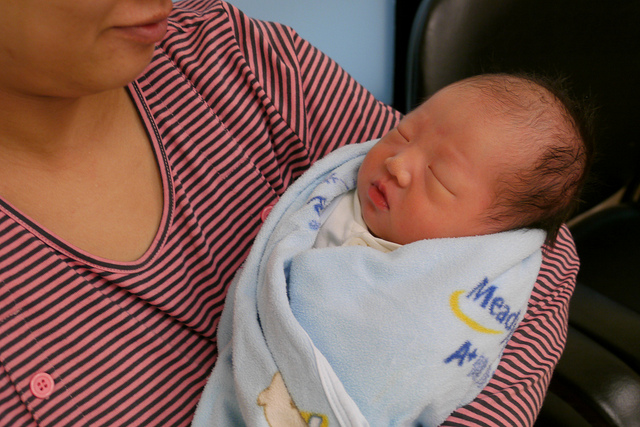


By Nadi (納狄)
Issue 641, Oct 14, 2013
Lifestyle, page 53
Translated by Elise Zheng
Original article: [Chinese]
In recent years, many middle and upper-class mainland Chinese couples have given birth to babies in Hong Kong.
Over the past few years, for around 100,000 to 200,000 yuan, an agent could arrange the whole process from hospital booking and nursing care to all the necessary registrations. In the past it’s been very popular because it gives the baby Hong Kong citizenship and all the better healthcare, education and travel opportunities that come with it. But now the drawbacks are starting to outweigh the benefits.
From 2006 to 2011, more than 200,000 Hong Kong babies were born to mainland parents. It aroused fierce public discussion and even protests among Hong Kong citizens. In response, Hong Kong’s government made policy adjustments to try and stop this trend that “occupies locals’ resources and space.”
Now, the mainland parents face another problem. Most don’t actually live in Hong Kong and their Hong Kong children aren’t entitled to an education in mainland public schools. And the fact that Hong Kong lacks the resources to educate these 200,000 mainland children is raising issues. At the Fengxi (鳳溪) kindergarten in New Territories, North Hong Kong, which is close to Shenzhen, some mainland parents line up five days in advance to get a registration form.
Mrs. Song comes from a middle-class Beijing family with an annual income of about 300,000 yuan. At first, she and her husband found it appealing to give birth in Hong Kong, even if it cost two-thirds of their annual income. After their baby was born in 2011, Mrs. Song felt they were part of the “upper-middle class.” She even felt closer to the senior executives in her company as they talked about reuniting with their children in Hong Kong.
But now some issues Mrs. Song hadn’t considered are presenting themselves. She previously hadn’t heard about the “Home Return Permit” needed if her child wants to frequently cross the border. Getting this permit requires navigating many bureaucratic hoops, but even when she gets it, her child will have to commute from Shenzhen to Hong Kong every day to attend school. The other option is to send her child to an international school in Beijing. Both choices are prohibitively expensive.
Mrs. Chen is a bit more affluent than Mrs. Song, but still firmly in the middle class. She can afford to send her son to private schools costing 60,000 to 120,000 yuan annually. However, language and curriculum issues will make it hard for him to pass the interview to get into a Hong Kong primary school if he goes to pre-school in the mainland.
Mrs. Chen finally decided to move from Beijing to Shenzhen. Before her 2-year-old son could be admitted to the Hong Kong pre-school, she had to queue up for registration, prepare a “resume” for the child and be interviewed. Then, she had to look for a school bus that runs between Hong Kong and Shenzhen. “This is an endless investment,” She said.
Mrs. Yao comes from an upper-class family. She’s not too worried about the problems Mrs. Chen and Mrs. Song are facing. “It’s not that tough if you’re rich,” she said.
Yao can afford to send her child to any top school in Beijing, but she doesn’t want to have to bribe the teachers and principals. So she bought a home in Hong Kong and enrolled her child in a top private school there. She also hired private tutors to teach her child Cantonese and violin on the side. Now Yao and her child fly back to Beijing on weekends to see the rest of the family. However, such an arrangement lies well beyond what middle-class families can afford.
Chen Guoji (陳國基), chief of Hong Kong’s Immigration Department, says that lately many mainland parents have asked him about canceling their child’s Hong Kong citizenship. “It is impossible to cancel their Hong Kong citizenship,” Chen said. “They should have thought twice before giving birth to their children in Hong Kong.”